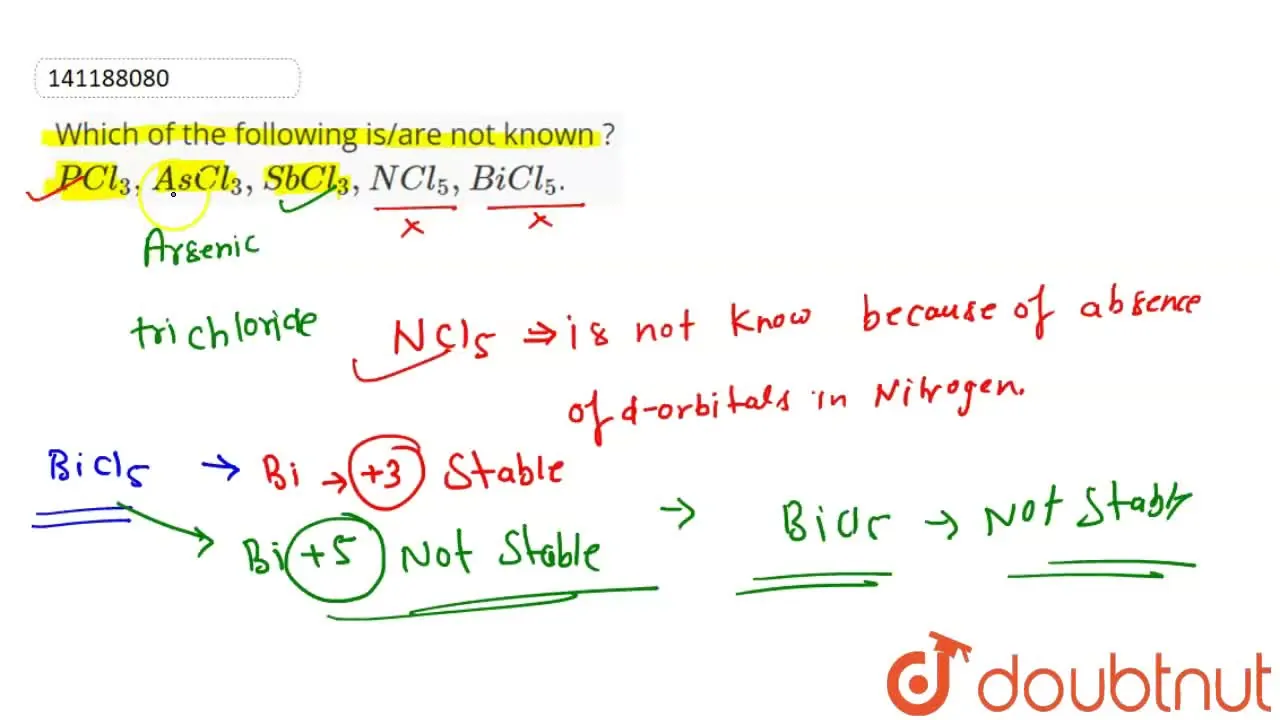Which of the following is/are not known ? PCl3,AsCl3,SbCl3,NCl5,BiCl5.
(i) NCI5 (due to absence of d-orbitals) (ii) BiCl5(Bi+5 being an oxidising agent oxidises Cl− ion to Cl2 and Cl− ion being a reducing agent reduces Bi+5 to Bi3+.
Related Playlists
- BOOK - PRADEEPCHAPTER - P-BLOCK ELEMENTS (NITROGEN FAMILY)EXERCISE - ADDITIONAL QUESTIONS (SHORT ANSWER QUESTIONS)20videos
P-BLOCK ELEMENTS (NITROGEN FAMILY)
- BOOK - PRADEEPCHAPTER - P-BLOCK ELEMENTS (NITROGEN FAMILY)EXERCISE - ADDITIONAL QUESTIONS (LONG ANSWER QUESTIONS)2videos
P-BLOCK ELEMENTS (NITROGEN FAMILY)
- BOOK - PRADEEPCHAPTER - P-BLOCK ELEMENTS (NITROGEN FAMILY)EXERCISE - NCERT EXEMPLAR PROBLEMS WITH ANSWERS, HINTS AND SOLUTIONS (Long Answers Questions)3videos
P-BLOCK ELEMENTS (NITROGEN FAMILY)
- BOOK - PRADEEPCHAPTER - ORGANIC CHEMISTRY-SOME BASIC PRINCIPLES TECHNIQUESEXERCISE - Competition Focus (Jee (Main and Advanced)/Medical Entrance) VIII. Assertion-Reason Type Questions25videos
ORGANIC CHEMISTRY-SOME BASIC PRINCIPLES TECHNIQUES
- BOOK - PRADEEPCHAPTER - REDOX REACTIONS EXERCISE - Assertion reason type question16videos
REDOX REACTIONS
Similar Questions
Which of the following is/are not known ? PCl3,AsCl3,SbCl3,NCl5,BiCl5.
View SolutionWhich of the following is more covalent : SbCl5orSbCl3 ?
View SolutionWhich of the following is more covalent : SbCl5orSbCl3 ?
View SolutionWhich are non-polar molecules?
I.NCl3 II.SO3 III.PCl5
The correct option is :View SolutionWhich of the following halides cannot be hydrolyzed ?
(A) NCl3 (B) NF3 (C) PCl3 (D) BiCl3View SolutionWhich of the following halides cannot be hydrolyzed? (A) NCl_(3) (B) NF_(3) (c) PCl_(3) (D) BiCl_(3)
View SolutionHow many of the following reaction yield POCl3 ?
(i)PCl3+O2→(ii)PCl5+CO2→(iii)PCl5+CH3COOH→(iv)PCl5+H3BO3→(v)PCl3+SO2Cl2→(vi)P4O10+NaCl→(vii)PCl5+H2O→(viii)PCl5+SO2→(ix)PCl3+SO3→View SolutionComplete hydrolysis product of 1 mole each of following will need how many total number of moles of NaOH for complete neutralisation?
SOCl2,SO2Cl2,PCl3,PCl5,NCl3View SolutionWhat happens when the following are heated ?
(i)PCl5(ii)H3PO3.View SolutionWhich is correct graph for following reaction ?
PCl5(g)⇔PCl3(g)+Cl2(g):ΔrH=+veView Solution


